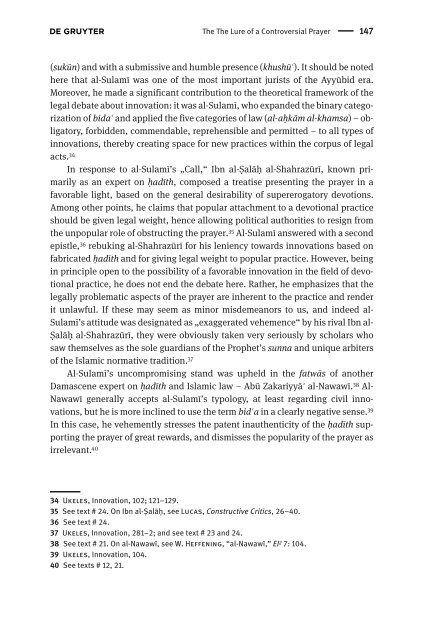0021-1818_islam_98-1-2-i-259
0021-1818_islam_98-1-2-i-259
0021-1818_islam_98-1-2-i-259
Create successful ePaper yourself
Turn your PDF publications into a flip-book with our unique Google optimized e-Paper software.
The The Lure of a Controversial Prayer 147<br />
(sukun) and with a submissive and humble presence (khushu^). It should be noted<br />
here that al-Sulam\ was one of the most important jurists of the Ayyubid era.<br />
Moreover, he made a significant contribution to the theoretical framework of the<br />
legal debate about innovation: it was al-Sulam\, who expanded the binary categorization<br />
of bida^ and applied the five categories of law (al-ahkam al-khamsa)– obligatory,<br />
forbidden, commendable, reprehensible and permitted – to all types of<br />
innovations, thereby creating space for new practices within the corpus of legal<br />
acts. 34<br />
In response to al-Sulam\’s „Call,“ Ibn al-Sala1 al-Shahrazur\, known primarily<br />
as an expert on hadith, composed a treatise presenting the prayer in a<br />
favorable light, based on the general desirability of supererogatory devotions.<br />
Among other points, he claims that popular attachment to a devotional practice<br />
should be given legal weight, hence allowing political authorities to resign from<br />
the unpopular role of obstructing the prayer. 35 Al-Sulam\ answered with a second<br />
epistle, 36 rebuking al-Shahrazur\ for his leniency towards innovations based on<br />
fabricated hadith and for giving legal weight to popular practice. However, being<br />
in principle open to the possibility of a favorable innovation in the field of devotional<br />
practice, he does not end the debate here. Rather, he emphasizes that the<br />
legally problematic aspects of the prayer are inherent to the practice and render<br />
it unlawful. If these may seem as minor misdemeanors to us, and indeed al-<br />
Sulam\’s attitude was designated as „exaggerated vehemence“ by his rival Ibn al-<br />
Sala1 al-Shahrazur\, they were obviously taken very seriously by scholars who<br />
saw themselves as the sole guardians of the Prophet’s sunna and unique arbiters<br />
of the Islamic normative tradition. 37<br />
Al-Sulam\’s uncompromising stand was upheld in the fatwas of another<br />
Damascene expert on hadith and Islamic law – Abu Zakariyya# al-Nawaw\. 38 Al-<br />
Nawaw\ generally accepts al-Sulam\’s typology, at least regarding civil innovations,<br />
but he is more inclined to use the term bid^a in a clearly negative sense. 39<br />
In this case, he vehemently stresses the patent inauthenticity of the hadith supporting<br />
the prayer of great rewards, and dismisses the popularity of the prayer as<br />
irrelevant. 40<br />
34 Ukeles, Innovation, 102; 121–129.<br />
35 See text # 24. On Ibn al-Sala1, see Lucas, Constructive Critics, 26–40.<br />
36 See text # 24.<br />
37 Ukeles, Innovation, 281–2; and see text # 23 and 24.<br />
38 See text # 21. On al-Nawaw\, see W. Heffening, “al-Nawaw\,” EI 2 7: 104.<br />
39 Ukeles, Innovation, 104.<br />
40 See texts # 12, 21.


